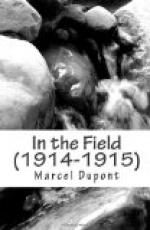The officer wrenched himself free, and went off with hasty strides, calling to us without turning his head:
“I know what I must do.... We can’t hold a line here.... I am going to form up by the artillery.”
Two more men came by, depressed and silent, bent down by the weight of their knapsacks. They crossed the ditches by the roadside with difficulty, and were presently lost to sight in the fields amidst the gathering shadows.
There was no laughter now in our ranks. The same thought was in every mind, the same despair chilled every heart. The Germans must have taken our trenches, and our brave comrades had all chosen to die rather than to retreat. And the enemy must be there before us, in that wood; they must be stealing up to us noiselessly. I fancied I could see them, gliding from tree to tree, holding their rifles high, trying to deaden the sound of their footsteps among the dead leaves. Presently they would reach the dark line that stretched before us, mute and mysterious; they would mass their dense reserves in the rear, and suddenly thousands of lightning flashes would illuminate the fringe of the thicket. I looked at my men again. There was no sign of wavering; not a word was spoken; their faces looked a little pale in the waning light. Above us thousands of shells and bullets filled the air with their strange and terrible music.
A man came out of the wood and walked quietly towards us. It was not light enough to distinguish his uniform, but his calm and placid bearing was in marked contrast to that of the infantry Chasseurs. He must have recognised the little group formed by the Major, my comrades, and myself in the middle of the road, for he made straight for us.
When he got to within twenty paces of us we recognised to our joy Sergeant Madelin, a non-commissioned officer of our second squadron, the squadron that had stayed in the trenches with the Colonel and the machine-gun section. I cannot describe the relief we felt at the sight of him. Though we could not tell what he was going to say, his attitude dispelled our fears at once. He gazed at us with wide astonished eyes from under the peak of his shako, and came on quietly, as if he were taking a walk, his hands in his pockets, murmuring in a tone of stupefaction:
“What on earth is the matter?”
“Well, really, this is a little too much!” exclaimed the Major; “that’s just what we want you to tell us!”
“But I have nothing to tell you, Major. The trench of the infantry Chasseurs was taken. We are all right. But the Colonel has sent me to say that there are signs of a German counter-attack on the left, and he wants you to reinforce him on that side with your three squadrons.”
He spoke so calmly and with such an air of astonishment that we all felt inclined to laugh. Madelin had already given proof of his courage, he had even been mentioned in orders for his valour, but we had never seen him so placidly good-humoured under fire as on this occasion. All our fears were at once put to flight, and we thought only of one thing; to fly to the help of our comrades and win our share of glory.




